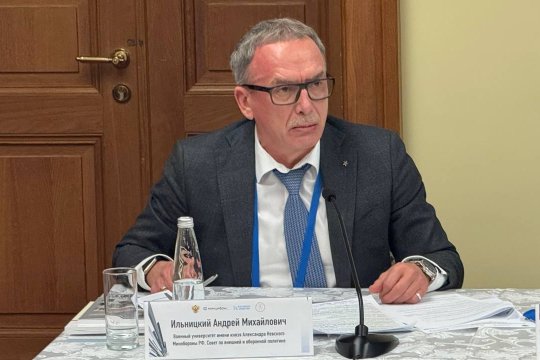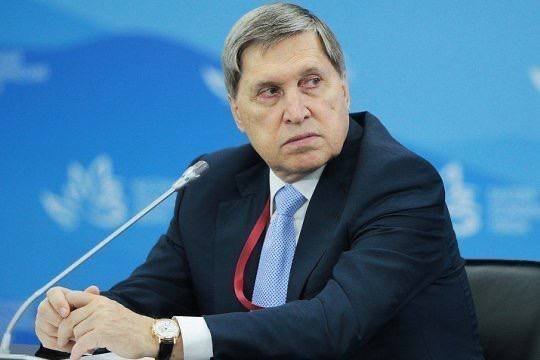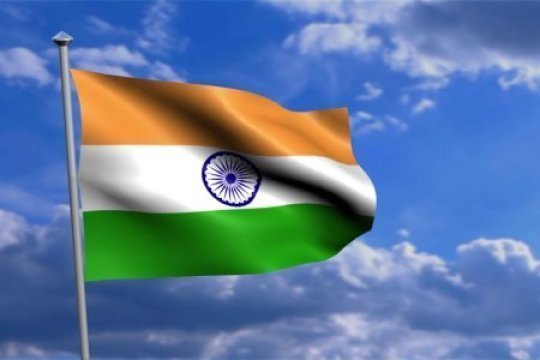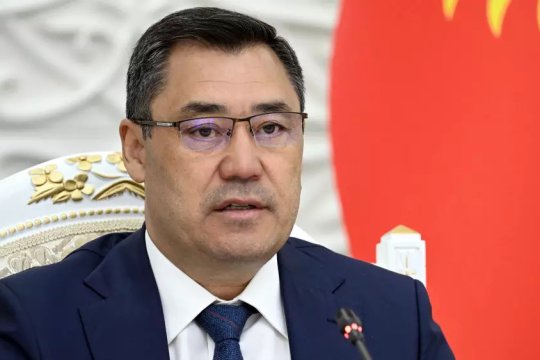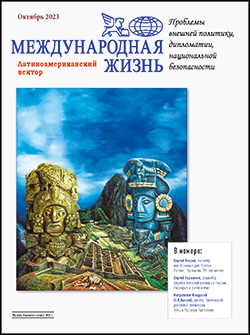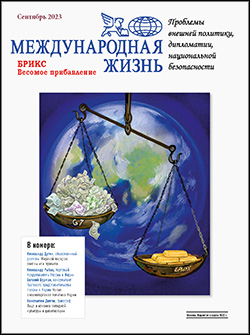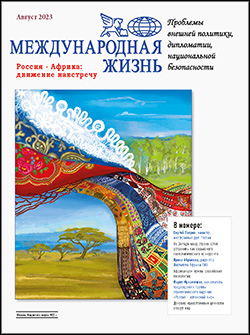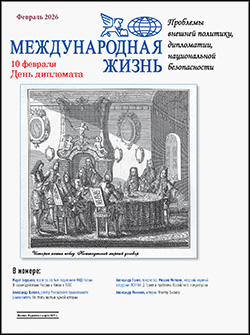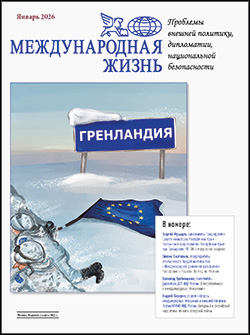Diplomacy
 Russia – US: The Epoch of Wasted Opportunities is Almost Over
Russia – US: The Epoch of Wasted Opportunities is Almost Over
S. Ryabkov, Deputy Foreign Minister of the Russian Federation
The dynamics of the relations between Russia and the US, which is in many instances burdened with problems, the New Start ratification, and the opportunities for the two countries' economic cooperation are analyzed on the eve of the Russia-US summit. The range of issues discussed includes such questions as what potential benefits we can draw from the Afghan transit and whether “Chinamerica” should be regarded as a threat to Russia.
Keywords: US, Russia, relations between Russia and the US, Strategic Arms Treaty
 Russia – EU: The Fine-Tuning Process
Russia – EU: The Fine-Tuning Process
A. Grushko, Deputy Foreign Minister of the Russian Federation
Over 20 countries responded at the highest level to Russian President D. Medvedev's proposal for a new Euro-Atlantic security architecture adequate to the realia of the new epoch and fit to counter the new threats and challenges Europe is facing
Keywords: Russia, EU, new security architecture, Final Act of the Conference on Security and Cooperation in Europe, WTO, visa-free regime, human rights
 The Shanghai Cooperation Organization is a Solution to a Broad Array of Problems
The Shanghai Cooperation Organization is a Solution to a Broad Array of Problems
L. Moiseev, Russian President's Special Envoy to the Shanghai Cooperation Organization
Originally the Shanghai Cooperation Organization's mandate was – speaking in the terms coined by our Chinese colleagues – “to fight the three evils”: terrorism, extremism, and separatism. The task continues to top the agenda of the organization which also ascribes high priority to economic cooperation.
Keywords: Shanghai Cooperation Organization, Council of Foreign Ministers, Afghanistan, terrorism, extremism, separatism
Golden Collection
 UN As a Coalition of All Talents
UN As a Coalition of All Talents
K. Yumkella, Director-General of the UN Industrial Development Organization
UNIDO is a specialized UN body authorized to assist in the industrial development and international industrial cooperation. It functions as a member of a wider UN “family” and as a network of inter-governmental institutions providing opportunities for maximally achieving goals of worldwide significance.
Keywords: UN Industrial Development Organization, UN, UN Economic and Social Council, United Nations Conference on Trade and Development
Politics
 Mechanisms of Russia-US Partnership
Mechanisms of Russia-US Partnership
V. Batyuk
Experience gained over millenniums makes it possible to ensure peace and stable international order without a world government. International regimes and the organizations established to sustain them provide some of the most efficient mechanisms of international cooperation.
Keywords: Relations between Russia and the US, international regimes, Russia-US institutions, models of relations between Russia and the US
 Great Britain in the Turbulence Zone
Great Britain in the Turbulence Zone
E. Anan'ev
The British elections are loaded with complexities and intrigue. It is clear who lost and has reasons to be upset, but not so obvious – whether there are winners in the game. The author suggests his own solutions to the conundrum.
Keywords: Great Britain, 2010 elections, D. Cameron, G. Brown, N. Clegg, Labour Party, Liberal Democrats, Conservative Party, British coalitional government
 History as Reflected by the Mirror of Nationalism
History as Reflected by the Mirror of Nationalism
M. Mayorov
Today's international relations abound with phenomena whose origins deserve careful analysis. Nationalism routinely treated as “the plague of the XX century” by politicians and historians in the not-so distant past is certainly one of them.
Keywords: Nationalism, historical awareness, people, original culture, soveriegn policy, national idea, historical memory
Modern History
 N. Korea's Nuclear Program: Implementation and Consequences
N. Korea's Nuclear Program: Implementation and Consequences
V. Kuzar'
The international community holds that N. Korea's nuclear status undermines global stability and security and demands that Pyongyang should scrap its nuclear program, while N. Korea's view is that as a sovereign country it is entitled to a deterrent. How likely is it that – as some six decades ago – the conflict on the Korean Peninsula will escalate?
Keywords: Nuclear tests, IAEA, six-party talks, nuclear weapons, N. Korea”s nuclear program, denuclearization of Korea
 The Summer of 1950 – Hot Times for Diplomacy
The Summer of 1950 – Hot Times for Diplomacy
A. Torin
In cooperation with the Department of History and Documents of the Russian Ministry of Foreign Affairs, the journal puts on display the previously unpublished documents shedding light on the Soviet diplomatic activity during the Korean War.
Keywords: Korean war, UN, Soviet-British relations, Soviet-US relations, A.A. Gromyko
 The Korean War: the Escalation of the Conflict
The Korean War: the Escalation of the Conflict
A. Frolov
The 1962 Caribbean crisis is typically cited as the riskiest standoff in history, but in fact humanity was confronted with an even more serious threat during the 1950-1953 Korean War which took millions of lives and left the Korean Peninsula devastated.
Keywords: Korean war, South Korea, North Korea, USSR, US, China, Yi Seungman, Kim Il-sung
 The Korean Problem and North East Asia's Security
The Korean Problem and North East Asia's Security
G. Ivashentsov
The socioeconomic development of Siberia and the Far East is a precondition for Russia's retaining its superpower status. The tasks of domestic development can only be addressed when no external threats are hanging over the country. Legacy of the Korean War remains the number one threat to the security of the Korean Peninsula which Russia would prefer to be a region of peace and cooperation free from its current military standoff and nuclear weapons.
Keywords: South East Asia, South Korea, North Korea, Korean war, the Korean Peninsula nuclear problem, six-party talks
 The U-2 Mystery
The U-2 Mystery
S. Khruschev
There was hope to achieve deeper understanding – or even to open truly serious talks - in the runup to the May, 1969 Paris Summit to be attended by the leaders of the USSR, the US, Great Britain, and France and the US President's June, 1960 visit to the Soviet Union. All of a sudden, everything collapsed...
Keywords: USSR, US, relations between the USSR and the US, N.S. Khruschev, US President D. Eisenhower, U-2, Francis Gary Powers
 The Barvikha Phenomenon – the Meiendorf Castle, the Temple, and the Luxury Village
The Barvikha Phenomenon – the Meiendorf Castle, the Temple, and the Luxury Village
B. Pyadyshev
The Barvikha sanatorium was built in 1930-1935 in a park on top of a hill and faced the Meiendorf Castle by architect B. Iofan. His works – the prestigious House on Embankment apartment block in downtown Moscow, the Soviet pavilions presented at the 1937 Paris and 1939 New York World Expos and the Moscow State University skyscraper – are widely acclaimed. The Barvikha project was also a success.
Keywords: Barvikha sanatorium, the Meiendorf Castle, the Luxury Village sanatorium
Bookshelf
 Is a Geopolitical Revolution Coming?
Is a Geopolitical Revolution Coming?
O. Bogomolov
The Cold War was a geopolitical rather than ideological conflict. Ideology in the Cold War simply disguised its more profound and long-term nature.
Keywords: Unipolar world, K. Brutents, US hegemony, the Yugoslavian venture, the invasion of Iraq, the understanding between the West and the East
 Today's Value Crisis
Today's Value Crisis
M. Granovskaya
The globalized world – a world lacking diversity – is the legacy of the epoch of modernity. What were the basic characteristics of the epoch when the ideology which led to a revision of the basic values of human existence emerged?
Keywords: Alain de Benois, ctiticism of liberalism, Enlightment epoch, ideology, modernism, postmodernism, heartland
 The Way to Reach the Goal
The Way to Reach the Goal
E. Osipov
Former French President Jacques Chirac's memoirs “Chaque pas doit être un but” are not his first book, but neither of the previous ones were biographic in character.
Keywords: Jacques Chirac, Charles de Gaulle, Georges Pompidou, Valéry Giscard d’Éstaing, François Mitterrand, opposition, premier, president, neo-Gaulleist
Russian World
 Their Names the World They Rescued Will Remember
Their Names the World They Rescued Will Remember
V. Sibilev
Young compatriots conference “Their Names the World They Rescued Will Remember” convened with the support from the Government Commission for the Affairs of Compatriots Living Abroad, the Foreign Ministry of the Russian Federation, and the Federal Agency of CIS Affairs.
Keywords: Department for Russian Compatriots’ Affairs, young compatriots” conference, falsification of history, Moscow ans St. Petersburg memorials
Читайте другие материалы журнала «Международная жизнь» на нашем канале Яндекс.Дзен.
Подписывайтесь на наш Telegram – канал: https://t.me/interaffairs

 00:00 14.09.2010 •
00:00 14.09.2010 • 